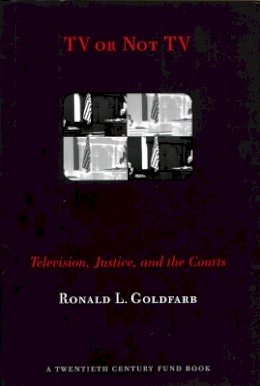
TV or Not TV
Ronald L. Goldfarb
In the last quarter century, televised court proceedings have gone from an outlandish idea to a seemingly inevitable reality. Yet,debate continues to rage over the dangers and benefits to the justice system of cameras in the courtroom. Critics contend television transforms the temple of justice into crass theatre. Supporters maintain that silent cameras portray "the real thing," that without them judicial reality is inevitably filtered through the mind and pens of a finite pool of reporters.
Television in a courtroom is clearly a two-edged sword, both invasive and informative. Bringing a trial to the widest possible audience creates pressures and temptations for all participants. While it reduces speculations and fears about what transpired, television sometimes forces the general public, which possesses information the jury may not have, into a conflicting assessment of specific cases and the justice system in general.
TV or Not TV argues convincingly that society gains much more than it loses when trials are open to public scrutiny and discussion.
Product Details
About Ronald L. Goldfarb
Reviews for TV or Not TV
Fred Graham,Chief Anchor and Managing Editor, Court Tv "Going beyond the ovious controversies of recent years, Goldfarb surveys the role of television in courtrooms with cool but crisp detachement. He brings historical context, legal analysis, and rich experience to bear on the issue, concluding that courts are public institutions that do not belong exclusively to the judges and lawyers who run them. His persuasive argument for greater openness is bound to influence future debate on the topic."
Sanford J. Ungar,Dean, School of Communication, American University "Goldfarb argues persuasively for cameras in the courtroom, O.J. notwithstanding. He is aware of the problems but believes strongly that the more open a courtroom, the more open and free our society. The challenge, which he describes so well, is to balance the new demanding technology against our traditional dedication to democracy."
Marvin Kalb,Director, Shorenstein Center on the Press, Politics, and Public Policy, Harvard University
